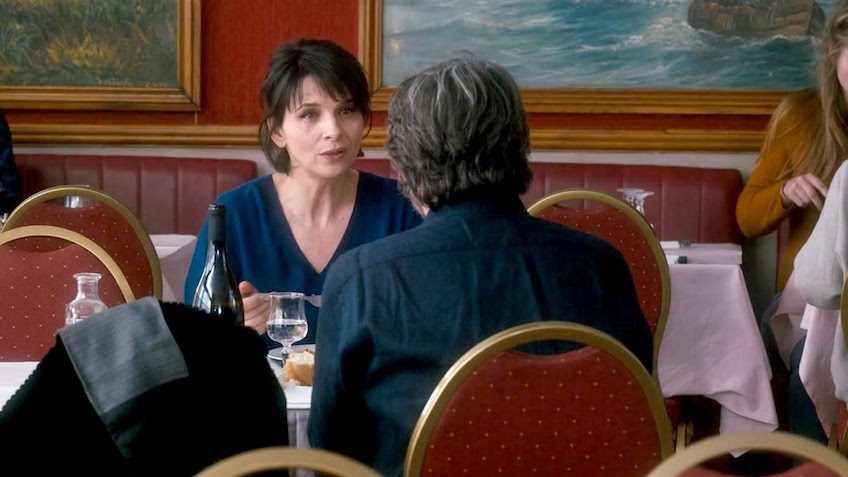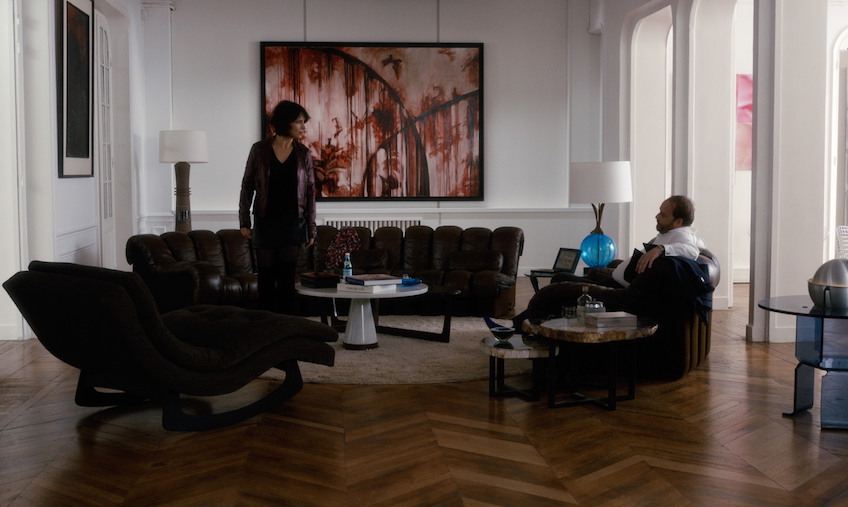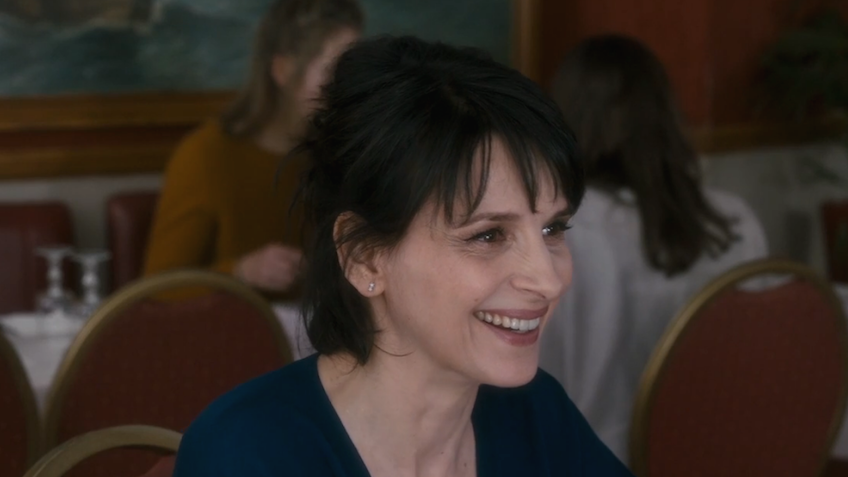Let the Sunshine In, Four Ways

During Critics Campus 2017 our critics took part in a live-editing workshop. Four of them reviewed Claire Denis’ Let the Sunshine In, and then edited their drafts with Nick Feik, editor of The Monthly. Read their final reviews below – and don’t forget to check out all of our Critics Campus coverage.

Review by Dominic Ellis
The prospect of Claire Denis adapting Roland Barthes into a romantic comedy starring Juliette Binoche is film festival crack. A nimbly diverse filmmaker, she engages her audience intellectually without suffocating them.
Alas, Denis’ Let the Sunshine In isn’t quite the Barthes adaptation that was promised, drawn only loosely from A Lover’s Discourse: Fragments, nor is it as much of a ‘romantic comedy’ as some would have you believe. What it is, though, is an insightful, darkly funny film anchored by an unconventional lead performance from Binoche.
Tracking the romantic escapades of Isabelle (Binoche), a listless divorcee and contemporary artist, Denis presents her with a panoply of men behaving badly. There’s obnoxious married banker Vincent (Xavier Beauvois) who gets a kick out of berating bartenders, a melodramatic actor (Nicolas Duvauchelle) who seems to be forever stuck in a Beckett play (“I feel like we said nothing and went no-where,” Isabelle tells him), and her older ex-husband (Laurent Grévill) who’s berated for his sleazy, porn-inspired bedroom manoeuvres.
With the exception of a delicate pouter (Paul Blain) with whom she shares a classic Denis dance scene, Isabelle’s suitors are uniformly awful, but none entirely disparage her pursuit of passion. Denis appears to be willing us to decide, do we admire or pity her singular goal? And, by extension, just how much agency does Isabelle have in all this?
Like many of Denis’ protagonists, we’re never told all that much about Isabelle beyond her sexual escapades. Her daughter and job only warrant a single shot each. It’s emotional in medias res insofar as we’re only allowed access to one particular aspect of Isabelle’s life and personality. Let the Sunshine In is extraordinarily perceptive when it comes to relationships. It doesn’t spare any of the heinous habits of men, nor the sexual desires of women. Isabelle, proving some degree of knowingness, explains to a friend her masochistic thrill from the banker, “I’d think ‘what a bastard’, then I’d orgasm.”
Agnès Godard’s camera treats each suitor differently, sometimes hovering drunkenly, sometimes seesawing between intense close ups, pairing well with Binoche’s multi-layered performance. It is hard to imagine anyone but her delivering Denis and co-writer Christine Angot’s words, conveying as much in her wounded silence as she does in a woodland-set rage against male entitlement.
A cameo by a much-loved bon vivant makes for a pitch perfect ending to a film that revels in the awkward under-layers of ‘romance’. Denis hasn’t adapted Barthes per se, but she shares his hangups with the semiotics of love. A refreshingly honest film if ever so slight by Denis’ standards.

Review by Kai Perrignon
There’s a tonne of sex implicit in Claire Denis’ new film Let the Sunshine In, but we only ever see it once, in the very first scene. Juliette Binoche’s Isabelle is framed from above, nude and vulnerable, her thrusting lover just off-screen, leaving her alone and distant. This wheezing married man, credited as ‘Vincent, The Banker’ demands that Isabelle orgasm. When she doesn’t, he insults her, and she slaps him before rolling away.
This bitter dissatisfaction – hilarious and real and uncomfortable – is the mode of choice for Denis’ latest, a breezy elliptical exercise from the usually sombre director. Let the Sunshine In is a rom-com without the sentimentality. A series of seductions and heartbreaks, the film follows Binoche’s indecisive and frustrated divorcee as she pings from suitor to suitor. Each sketch gives Denis and co-writer Christine Angot a chance to explore various types of romantic disillusionment. There’s the Banker, careless but always ready to fuck; the inhibited actor, narcissistic and oversharing; the paternal figure, loving but too safe. The list goes on, including but not limited to a preening silent type, as well as Denis regular Alex Descas as a 50-year old romantic.
These men are all abstractions – though each actor is superb, they work in fragments, appearing for a few funny monologues before disappearing into the margins. Binoche brings soul and authenticity to what could come off as a rom-com-archetype - the indecisive divorcee, here trapped in a cycle of masochistic pursuits. But she’s too good an actress to come off as a stock figure, showing self-awareness and a deep well of rage that makes her struggle feel real. We don’t often get a chance to see the romantic struggles of women this age onscreen, and Binoche brings a palpable sense of frustration to her often self-inflicted relationship woes. Isabelle is a real person surrounded by caricatures.
Agnes Godard’s lonely camerawork turns the film’s multitude of conversations into a series of melancholic singles, which isolate Isabelle and highlight the deep sadness of her travails. When this pain is felt, it burns.
Still, Let the Sunshine In is more satisfactory as an intellectual exercise than an emotional journey. No one changes, no answers are given. Instead, Denis arranges a web of romantic frustrations and lets the audience find meaning on their own. A provocation, but a winning one.

Review by Blythe Worthy
When we meet her, Isabelle (Juliette Binoche) is nude on her back, facing the camera and seemingly alone. A balding, tawny head moves into shot and we learn she is having unsatisfactory, tearful sex with a married banker named Vincent (a wonderfully predatory Xavier Beauvois). Afterward, she mutters unconvincingly to herself about the allowances of love for women her age, struggling heartily to remove her thigh high stiletto boots. Inspired by Roland Barthes’ A Lover’s Discourse: Fragments (1977), with a script adapted by Jean-Pol Fargeau and novelist Christine Angot, Claire Denis’s Let the Sunshine In is a deep-dive into a middle-aged woman’s love life.
In the fashion of Barthes’ collection of musings, the film skips rapidly through Isabelle’s experiences with men in a pace matched to her growing disillusionment. However, the more the men talk at her, the more Barthes’ snatches of erudite philosophy flicker to simply become bourgeoisie nonsense, washing over her in often-redundant conversations. Barthes is played for laughs that only occasionally land, with Binoche’s over-reliance on ‘comedic’ spluttering at the outrageous utterances of her lovers becoming wearying as the film progresses.
The dialogue is far more successful in moments of simplicity, such as when Isabelle begs a lover “Take care of me a little bit” in a painfully small voice. Though this display of vulnerability seems daring, Denis’s approach to middle-aged feminine sexuality isn’t necessarily fresh. The character recalls Binoche’s role in Olivier Assayas’s 2015 drama Clouds of Sils Maria, another fortysomething divorcee creative type struggling with the myriad follies of middle aged men. Denis’s hyper-focus on Isabelle ‘feeling feelings’ obscures the character’s other dimensions, sacrificing her exterior life so that she exists as the sum of her emotions. Isabelle is a jobbing artist, yet we only really see her paint once, while interactions with her daughter are limited to lukewarm high-fives through a car window. Her character simply isn’t fully developed.
Though Isabelle herself is sketched thinly, Let the Sunshine In does have moments that bristle with a verdant palette of emotions. Delicious pops of colour optimise the film’s articulation of sentiment, as well as referencing Denis’s patriotic love of Krzysztof Kieślowski’s Les Trois Coleurs (1993-1994). In an early scene, Vincent marches about in electric cerulean loafers whilst coldly lecturing Isabelle on love and desire, but later grovels at her front door with a lily-livered yellow bouquet of roses. Weaving expertly through the film’s dud dialogue is Agnes Godard’s 360° camera, which vacillates calmly from Isabelle to Vincent, somehow filling a casual bar scene with ‘civilised’ tension. However, between the hung pauses, unfinished sentences and awkward, rapid-fire dialogue, Denis’s ill-matched pairing with Barthes in this lit-romance is a superb misfire.

Review by Keva York
At the beginning of A Lover’s Discourse, Roland Barthes lays out his intentions: “What is proposed, then, is a portrait – but not a psychological portrait; instead, a structural one which offers the reader a discursive site[.]” Claire Denis takes up Barthes’ proposition in her latest film, Let the Sunshine In: she used his lover’s manual as a springboard in creating her own structural portrait of an amorous protagonist. Juliette Binoche plays Isabelle, an artist living in Paris: she is divorced, lonely, and caught up in a quest for – what else – “real love.” But “love” here is less a feeling attached to a particular individual, and more a way of being in the world: Isabelle is subsumed by a need for connection, her love endlessly transferable.
In pursuit of that connection, Isabelle blunders through a series of overlapping liaisons with largely unavailable and unendearing men. Each pairing is shaped by stilted and painful conversations, long silences amplifying the tension between the lovers. Every character proves changeable, prone to outburst and melancholia, their actions generally lacking in clear motivation: like Barthes, Denis restricts our access to their internal machinations – their psychology – in order to draw out the absurdity of the lover’s plight. And yet this heavy material is treated with a surprisingly light touch, the film veering toward romantic comedy – new terrain for Denis. Isabelle’s struggle to navigate her complex, colourful love life is punctuated with absurdist interludes – not least Gerard Depardieu’s appearance as a clairvoyant in the film’s hypnotic final sequence, in which he indirectly propositions Isabelle by suggesting that her future holds “meatier, weightier, sturdier” possibilities for her.
The credits roll over this final scene, the lack of traditional closure indicative of the interminability of Isabelle’s love quest. She and her paramours are seemingly bound to turn towards and away from each other again and again. This kind of about-face is best captured in a moment between Isabelle and a friend in a restaurant bathroom, Isabelle confessing to having recently slept with her ex-husband. She describes feeling ecstatic, “so lucky,” the morning after they made love, and her face lights up; it then immediately falls again as she tells how, the morning after that, she came to feel exactly “the opposite.” In lesser hands, Isabelle’s oscillations might have descended into farce, or tedium, but Binoche infuses her character with a magnetic (and apt) luminosity, and Denis renders the material with her trademark measured, meditative sensuality. Despite a bleak outlook on the possibility of “real love,” Let the Sunshine In is a strangely warming experience.